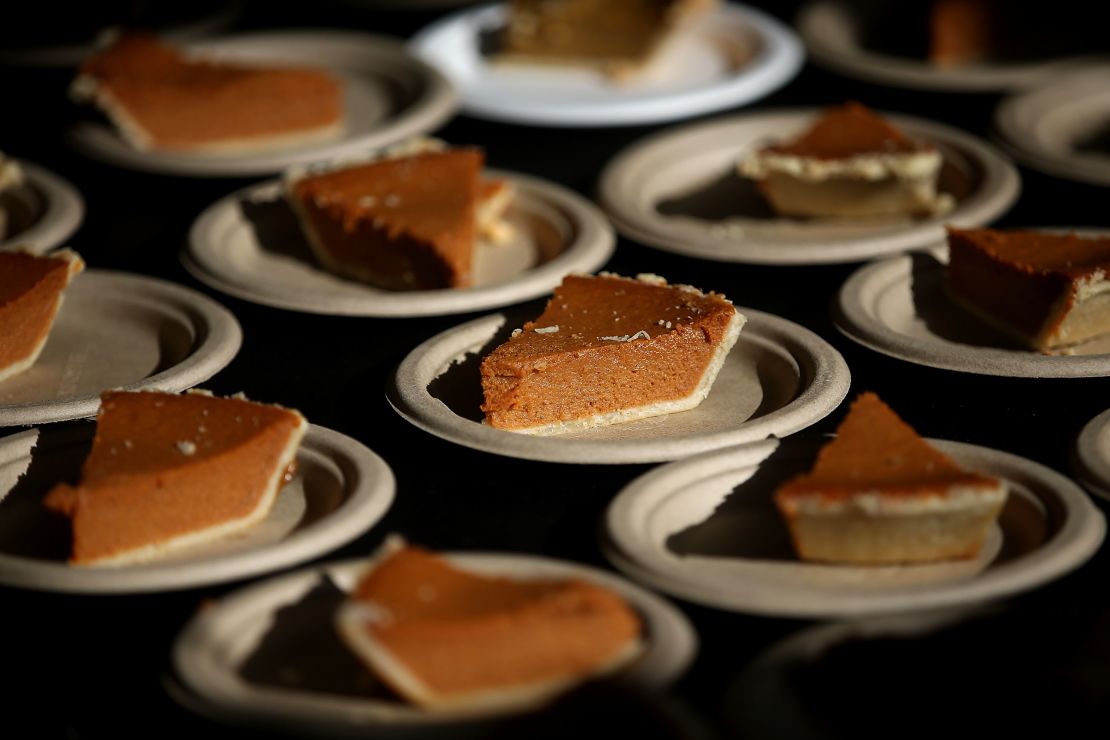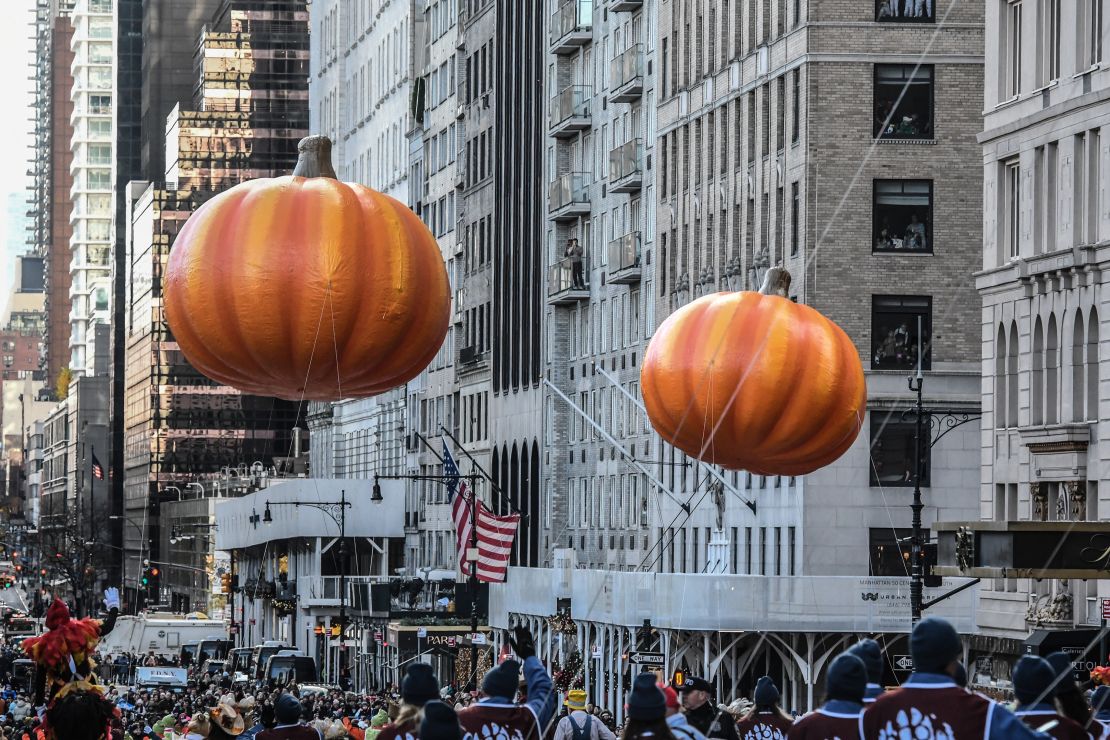Nothing says fall like a pumpkin spice latte. And over the past decade, that sentiment now includes baking pumpkin spice muffins, pouring pumpkin spice booze, lighting a pumpkin spice candle, throwing a pumpkin spice dog treat and, yes, even taking out pumpkin spice trash bags and using pumpkin spice wipes.
Some find pumpkin spice — and its earlier and earlier introductions — straight-up obnoxious, running the risk of the trend flattening. Others think the flavor, whose fans are often women, is unfairly targeted as “basic.” Regardless, its polarizing position on American taste buds confirms its place as the emblem of fall.
Caitlin Covington, whose fall aesthetic of autumn foliage, chunky knitwear and curled tresses has earned her the internet’s affectionate meme “Christian Girl Autumn,” said it brings her back to childhood.
“I just think there’s something so comforting about those scents and about those flavors,” Covington said. She said the flavor reminds her of doing her homework at the kitchen table while her mom lights a pumpkin spice candle and bakes cookies.
Simply put, pumpkin spice reminds us of warm, fuzzy feelings. And consumers are willing to pay to feel that nostalgia, even if it’s still 90 degrees outside. Americans spend more than $500 million on pumpkin spice products each year, according to data from Nielsen.
Nothing is more American than a pumpkin pie at Thanksgiving dinner with friends and family, Northwestern marketing professor Jacqueline Babb said.
“There is something about the cinnamon and sugar smell that brings us back to this cozy fall feeling,” she explained. “By eliciting those feelings of cozy and family, you’re elevating your brand from a hot beverage or trash bag to something that means something to people.”
Pumpkin spice doesn’t actually taste like the homely seasonal gourd. Instead, it’s a wide-ranging blend of cinnamon, brown sugar, ginger, cloves, allspice and nutmeg (though Starbuck’s pumpkin spice latte, or PSL, does contain pumpkin puree).
There’s a deep and rich imagery associated culturally with the pumpkin, benefiting pumpkin spice just by association. It evokes cornucopias, harvests, jack o’lanterns and the story of Thanksgiving —?something Americans of all cultural backgrounds come into some contact with.

Several pumpkin spice pages on Facebook have more than 50,000 members and are active year-round. People, mostly women, on the internet find community in posting all things fall throughout the year, of their pumpkin adorned mantels, latest pumpkin spice grocery store finds and fall-themed graphics.
Covington earned herself the title of the queen of fall with her cozy, pumpkin-themed posts (this year, she’s traveling from her home state of North Carolina to Maine and Vermont for her anticipated autumnal trip).
Thanks, Starbucks
You can thank Starbucks for pumpkin spice in our lives.
Pumpkin spice wasn’t much of a thing in the early 2000s, Peter Dukes, then the leader of the Starbucks Espresso product team that brought the PSL to life, told CNN in 2023.
In 2002, the chain launched a holiday peppermint mocha that resonated with customers. Starbucks later started putting together a list of fall beverages to introduce – though drinks with caramel and chocolate were popular among patrons, pumpkin scored higher on uniqueness.
After much debate, the company decided to test a pumpkin pie flavored latte in 100 locations in Washington, DC, and Vancouver. It rolled out across North America the following year.
“Starbucks was really smart to see that that was established. And they probably asked themselves, how can we create a product that taps into all the imagery, the romance and the positive affinity with the season and that flavor profile?” said Mark Lang, associate professor of marketing at The University of Tampa.
Many soon-to-be fans had their first taste of pumpkin spice at the coffee chain. Covington said she had her first PSL at her first job as a working adult in 2014, when she needed coffee to get going in the morning.
“That’s when I discovered Starbucks had the pumpkin spice latte, and I really fell in love with it,” Covington said.
Pumpkin spice has been so successful at ingratiating itself into American culture because of human nature, Lang said. Humans seek variety and stimulation, and pumpkin spice was the perfect combination of novelty and familiarity.

Customers also flock toward its limited availability and seasonality. It echoes back to the old days and the excitement when you could finally buy a certain fruit at the supermarket, like peaches in August.
“It was signaling the beginning of a season, which, as humans, we like that cycle,” Lang said. “These seasonal things are tied to the patterns of agriculture, and our society was created around agriculture.”
Pumpkin spice season could also be a lifeline for Starbucks, which has had a rocky year complete with a CEO switch-up and dipping sales —?about 10% of the chain’s overall sales come from seasonal staples. The chain brought the PSL back earlier than ever this year.
“It’s still one of our top beverages,” said Thomas Prather, VP of marketing at Starbucks, told CNN in 2023. “It kind of amazes me as a marketer, year over year.”
Brands have tapped into pumpkin spice’s multi-sensory marketing?—?you can taste the spice, smell the candles and evoke all those old-timey feelings.
Another good reason to invest in pumpkin spice —?it kicks off the holiday season, the most lucrative time of year for sales across many industries. But there’s a risk that by introducing fall earlier and earlier each year, marketers are overextending the very thing that made pumpkin spice special. Pumpkin product sales dipped slightly compared to 2023, according to the NIQ data reported in USA Today.
“You’re trying to make it an everyday flavor, and I don’t think that works,” Lang said.
But for the biggest fans of pumpkin spice, fall is more of a lifestyle than a season.
“I welcome it, even if it’s blazing hot outside,” Covington said. “In my mind, I’m just picturing a chilly fall day. I have my cozy book and my coffee.”
Danielle Wiener-Bronner contributed to this story.





